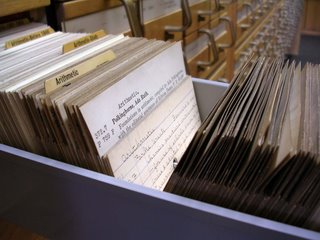
Following more than a century of service, the Dewey card catalog, so named for the classification system used for the books represented in it, is being dismantled over fall break make room for the Mudd Center’s future
Academic Commons. The Dewey catalog, which dates back to 1885, served as the library’s union catalog, listing materials in the main and departmental libraries until it was “frozen” in 1974 when the main library moved from Carnegie to the new Mudd Center and began using the Library of Congress classification system.
As no new cards had been added to the catalog in over 30 years, and virtually all of the information listed in it was converted into computerized format during a major retrospective cataloging project in the 1980s, the Dewey catalog has become increasingly outdated and inaccurate. Nevertheless, it provided a fascinating peek into the College’s early years, mirroring curricular trends, passing fads, and the sometimes arcane collecting interests of Oberlin librarians of yore. It revealed, through worn and stained cards, which subject areas were frequently consulted by patrons. As an artifact, the catalog also illustrated the history of librarianship, reflecting cataloging styles and methods over the decades, from the handwritten half-cards of the 19th century to the computer printed cards that began appearing in the early 1970s. Head of Special Collections and Preservation Librarian Ed Vermue has selected over 450 sections of catalog cards—-comprising approximately 120 drawers’ worth (a 7% sample)—-to save as a permanent archive in Special Collections.
Cards not selected for the catalog archive will be recycled or used for note cards. The Library of Congress catalog, the Dewey catalog’s smaller, late 20th century counterpart, was maintained from 1975 until it was “frozen” in the late 1980s. It was removed from the library in 1998. From the beginning, all of the records included in the LC catalog were duplicated in electronic format. The library installed its first online catalog in 1987 and the second generation of OBIS came online in 1995.
The library’s shelflist, a card file representing books owned by the library and filed in call number order, remains available in the library’s Monographs Dept. area as a record of each item still owned that is classified in the Dewey system.




